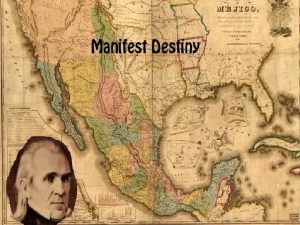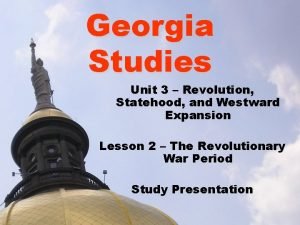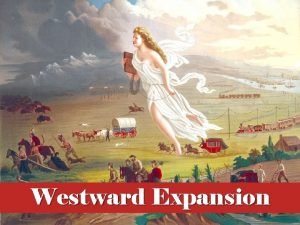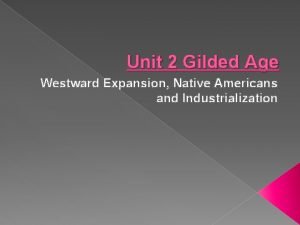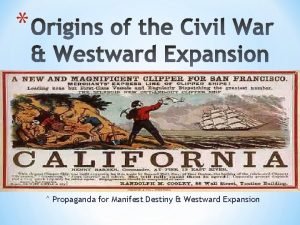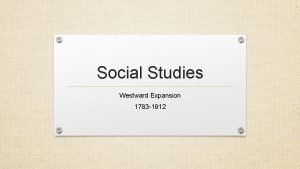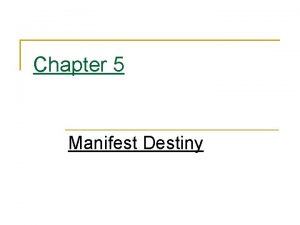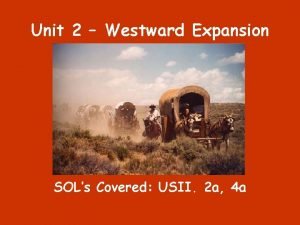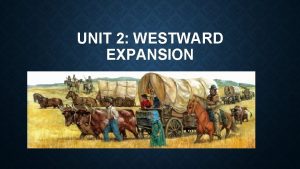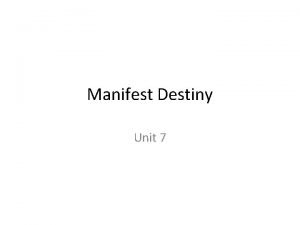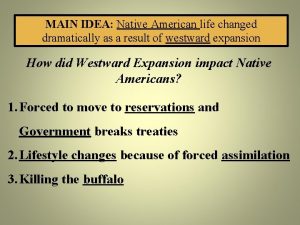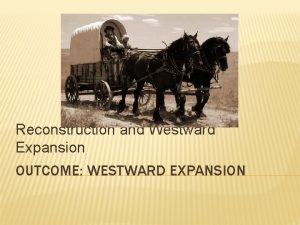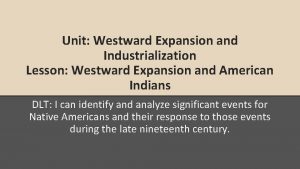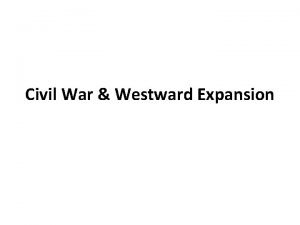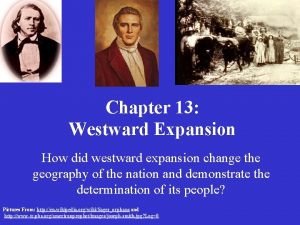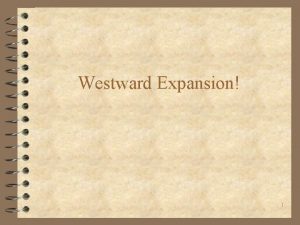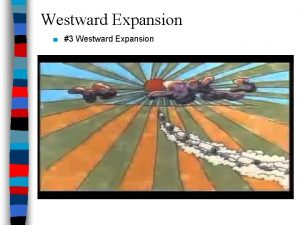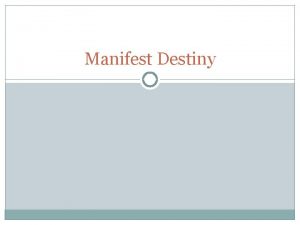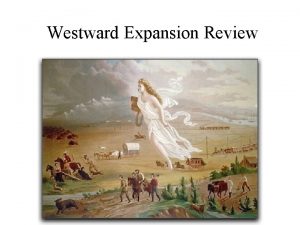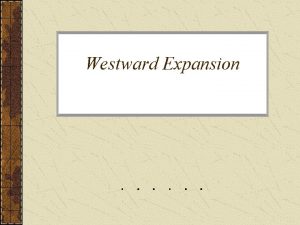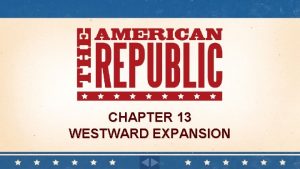The United States and Imperialism Westward Expansion Colonial
















- Slides: 16

The United States and Imperialism

Westward Expansion • Colonial America • Louisiana Purchase • The Mexican-American War

William Seward Secretary of State for Abraham Lincoln and Andrew Johnson (1861 -1869 Argued that the United States “must command the empire of the seas, which alone is real empire. ” Trade or commerce would lead to more opportunities for Americans and help spread American ideals. The nation that draws the most material and provisions from the earth, fabricates the most, and sells the most of production and fabrics to foreign nations will be the great power of earth. ” Promoted trade with Asia: a transcontinental railroad, isthmian canal, and acquisition of Pacific Islands (including Hawaii) Organized the purchase of Alaska from Russia for $7. 2 million to create a “draw bridge” to trade with Asia Ridiculed as “Seward’s Folly, ” “Seward’s Icebox, ” and the “Polar Bear Garden”

Dependency on Foreign Trade Frederick Jackson Turner: (1893) “The Significance of the Frontier in American History” (or simple the Frontier Thesis) According to Turner the frontier (the West) which acted as a “safety valve” for America’s immigrant population and poor was now closed America would need a new “frontier. ” Global Trade and Sea Power By the 1890 s, the American economy was increasingly dependent on foreign trade. A quarter of the nation’s farm products and half its petroleum were sold overseas

A Desire for Sea Power • Alfred Thayer Mahan, a naval strategist and author of The Influence of Sea Power Upon History, argued that national prosperity and power depended on control of the world’s sea-lanes. “Whoever rules the waves rules the world, ” Mahan wrote.

The Metropolitan Club Members included: Alfred Mahan: Sec. of Navy Teddy Roosevelt, Admiral George Dewey, and Congressman Henry Cabot Lodge These men promoted overseas expansion to protect trade and project American power.

The Annexation of Hawaii Traders and missionaries visit Hawaii in mid -1800 s The United States refuses to sign a treaty recognizing Hawaiian independence in 1843 Seward attempts to annex Hawaii after the Civil War But American sugar producers didn’t want competition from Hawaii As trade opened up, however, rich American planters, like Sanford B. Dole, gained more control over Hawaii

The Annexation of Hawaii In 1893, a small group of sugar and pineapple-growing businessmen, like Dole, backed by the U. S. military, depose (remove from power) Queen Liliuokalani, seized 1. 75 million acres of land, and conspired for U. S. annexation of the islands, which eventually took place in 1898, after the U. S. declared war on Spain. Sanford Dole was made the first governor

Origins of the Spanish-American War Cuba had been a Spanish colony for hundreds of years. However, with the Spanish empire in decline, and the sugar-based economy of Cuba struggling, the people of Cuba began rebelling against Spanish authorities on the island.

The USS Maine American businessmen had vast property interests in Cuba The USS Maine was dispatched to Cuban to protect these property interests On February 15, 1898, the Maine mysteriously exploded and the US blamed a Spanish mine.

The Yellow Press – sensational journalism designed to increase newspapers sales Through their multiple newspapers, William Randolph Hearst Joseph Pulitzer exaggerated events in Cuba, the plight of the people and the Maine explosion, which worked many Americans into a pro-war frenzy

The Teller Amendment After the explosion, Mc. Kinley asked congress for a declaration of war The declaration of war was granted (42 -35 in the Senate and 311 -6 in the House of Representatives) However, Sen. Henry Teller of Colorado added an amendment to the declaration of war, declaring the Unties States had no desire for “sovereignty, jurisdiction, or control” over Cuba.

The Spanish-American War The war began with a naval attack on the Spanish fleet in the Philippines (also a Spanish colony) at Manila Bay – a decisive victory for the U. S. Following a blockade of Cuba, an expeditionary force of 17, 000 American landed in Cuba One of the most famous battles was the battle of San Juan Hill (misnamed) Two American regiments were involved: one compose of regular troops; the other composed of a diverse group of cowboys, buffalo soldiers (a segregated group of black troops), and eastern aristocrats, including the man who organized the group that would become known as the Rough Riders – Teddy Roosevelt TR’s involvement in the battle was hyped be the “yellow press” and set him up for the Governorship of New York and the road to the presidency.

The war lasted only three months and war described by Sec. of State John Hay as “a splendid little war. ” The war was officially concluded with the Treaty of Paris, in which Spain gave up its Colonial possessions of Cuba, Puerto Rico, Guam, and the Philippines to the U. S. A diverse group of Anti-Imperialists including William Jennings Bryan, Andrew Carnegie, Mark Twain, and former President Grover Cleveland other discouraged American Imperialism

The Philippine American War (AKA the Filipino American War/Philippine Insurrection/Tagalog Insurrection) The Filipino people were not happy having the Americans as a new occupying force Emilio Aguinaldo, who had fought for independence against the Spanish, now led a revolt against the U. S. It took more than two years and 125, 000 American soldiers to suppress the revolt More than 200, 000 Philippine civilians died American forces targeted civilians and used torture in an effort to end the Filipino resistance.

The Platt Amendment February 25, 1901: To get around the Teller Amendment the United Stated force the Cubans to accept The Platt Amendment (named after Senator Orville Platt) as a condition of their “independence. ” The Platt Amendment limited Cuba’s independence in several substantial ways: Treaties with other countries U. S. had right to intervene in Cuba forced to lease land for coaling and naval stations to U. S.
 Expansion of the united states of america 1607 to 1853 map
Expansion of the united states of america 1607 to 1853 map Westward expansion lewis and clark
Westward expansion lewis and clark Unit 3 rev. statehood and westward expansion
Unit 3 rev. statehood and westward expansion Facts about westward expansion
Facts about westward expansion Westward expansion vocabulary words
Westward expansion vocabulary words Westward expansion acrostic poem
Westward expansion acrostic poem Manifest destiny propaganda poster
Manifest destiny propaganda poster Westward expansion virtual field trip
Westward expansion virtual field trip American historama lewis and clark
American historama lewis and clark American expansion westward/manifest destiny
American expansion westward/manifest destiny Who made it
Who made it Westward expansion wagon
Westward expansion wagon Homeland security
Homeland security Westward expansion vocabulary
Westward expansion vocabulary Unit 2 westward expansion vocabulary
Unit 2 westward expansion vocabulary Effects of westward expansion
Effects of westward expansion Assimilation westward expansion
Assimilation westward expansion
